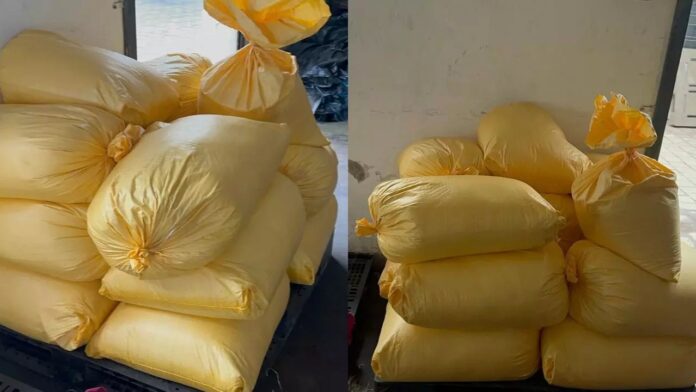₹5,000 Crore Cocaine Seizure in Gujarat Marks Third Major Drug Bust in 11 Days: Why India is Grappling with Rising Drug Trafficking
In a significant drug bust, the Delhi Police and Gujarat Police, in a joint operation, seized 518 kilograms of cocaine valued at ₹5,000 crore in Ankleshwar, Gujarat. The operation, which took place on Sunday, marks the third major cocaine seizure in India within the past 11 days. The cocaine was discovered during a search at Avkar Drugs Limited Company, according to a report by ANI.
This large-scale bust follows two recent cocaine seizures in Delhi. On October 10, the Delhi Police Special Cell seized 200 kilograms of cocaine, estimated to be worth ₹2,000 crore, from a rented shop in West Delhi’s Ramesh Nagar. The drugs were cleverly hidden in plastic packets labeled as snacks, with names like “Tasty Treat” and “Chatpata Mixture.” Authorities recovered approximately 20 to 25 packets, concealed in cartons, from a narrow shop in the area. This operation, similar to the one in Gujarat, demonstrated the sophisticated methods drug traffickers are using to smuggle narcotics into India.
Just days before, on October 2, another massive drug haul took place. The Delhi Police Special Cell seized over 560 kilograms of cocaine and 40 kilograms of hydroponic marijuana, valued at a staggering ₹5,620 crore, from a godown in South Delhi’s Mahipalpur. This seizure led to the arrest of four individuals: Tushar Goyal (40), Himanshu Kumar (27), and Aurangzeb Siddiqui (23), all residents of Delhi, and Bharat Kumar Jain (48) from Mumbai. As the investigation continued, two more suspects were apprehended from Amritsar and Chennai, and the police also arrested one Akhlak from Hapur, Uttar Pradesh, bringing the total number of arrests in the case to seven.
These back-to-back seizures indicate a growing concern regarding the trafficking and distribution of cocaine in India. The sheer volume of drugs and their enormous street value suggest that organized crime syndicates may be targeting India as a major market for narcotics, as well as a potential transit hub for international drug trafficking networks.
Law enforcement agencies, including the Delhi Police and the Gujarat Police, have intensified their efforts to curb the drug menace. These recent operations highlight the critical need for coordinated efforts between state and central agencies to combat the rising influx of narcotics into the country. The successful collaboration between police forces in different states has already resulted in substantial drug seizures, but these discoveries also underscore the complexity and scale of the illegal drug trade.
With these significant seizures, authorities are now probing deeper into the networks behind the drug trafficking operations. Investigations are expected to expand, focusing on uncovering the entire supply chain, including international connections, financiers, and local distributors. Given the high value of the seized drugs, the involvement of well-organized cartels is almost certain, and further arrests and seizures could be on the horizon.
The drug problem is a growing challenge for India, not only in terms of law enforcement but also in terms of public health. The surge in cocaine trafficking raises concerns about the impact it could have on Indian society, particularly among young people and vulnerable communities. As the country grapples with this emerging crisis, authorities will need to continue their vigilance in dismantling the networks responsible for bringing these dangerous substances into the country.
In conclusion, the recent seizures of cocaine worth thousands of crores in Gujarat and Delhi mark a significant victory for law enforcement agencies, but they also serve as a stark reminder of the growing challenge posed by drug trafficking in India. The collaborative efforts of the Delhi and Gujarat Police demonstrate the importance of inter-agency cooperation in tackling large-scale criminal operations. However, the fight is far from over, as drug syndicates continue to evolve and adapt their methods to avoid detection. The coming months will likely see more intensive investigations and actions as authorities work to stem the flow of narcotics into India.

